Junhao Li
ActErase: A Training-Free Paradigm for Precise Concept Erasure via Activation Patching
Jan 01, 2026Abstract:Recent advances in text-to-image diffusion models have demonstrated remarkable generation capabilities, yet they raise significant concerns regarding safety, copyright, and ethical implications. Existing concept erasure methods address these risks by removing sensitive concepts from pre-trained models, but most of them rely on data-intensive and computationally expensive fine-tuning, which poses a critical limitation. To overcome these challenges, inspired by the observation that the model's activations are predominantly composed of generic concepts, with only a minimal component can represent the target concept, we propose a novel training-free method (ActErase) for efficient concept erasure. Specifically, the proposed method operates by identifying activation difference regions via prompt-pair analysis, extracting target activations and dynamically replacing input activations during forward passes. Comprehensive evaluations across three critical erasure tasks (nudity, artistic style, and object removal) demonstrates that our training-free method achieves state-of-the-art (SOTA) erasure performance, while effectively preserving the model's overall generative capability. Our approach also exhibits strong robustness against adversarial attacks, establishing a new plug-and-play paradigm for lightweight yet effective concept manipulation in diffusion models.
AutoLugano: A Deep Learning Framework for Fully Automated Lymphoma Segmentation and Lugano Staging on FDG-PET/CT
Dec 08, 2025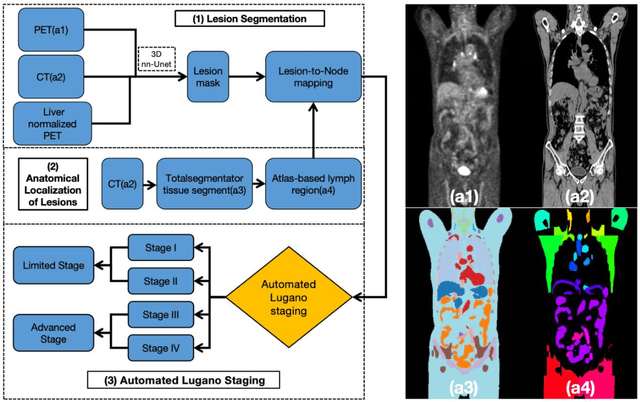
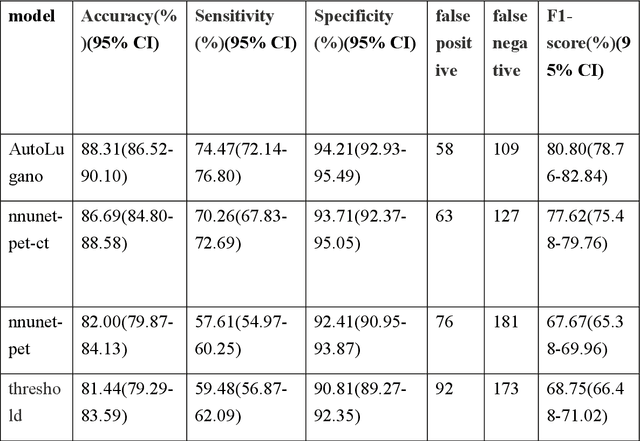
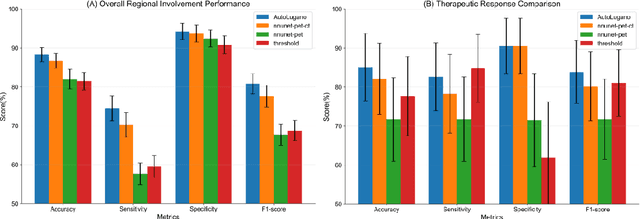
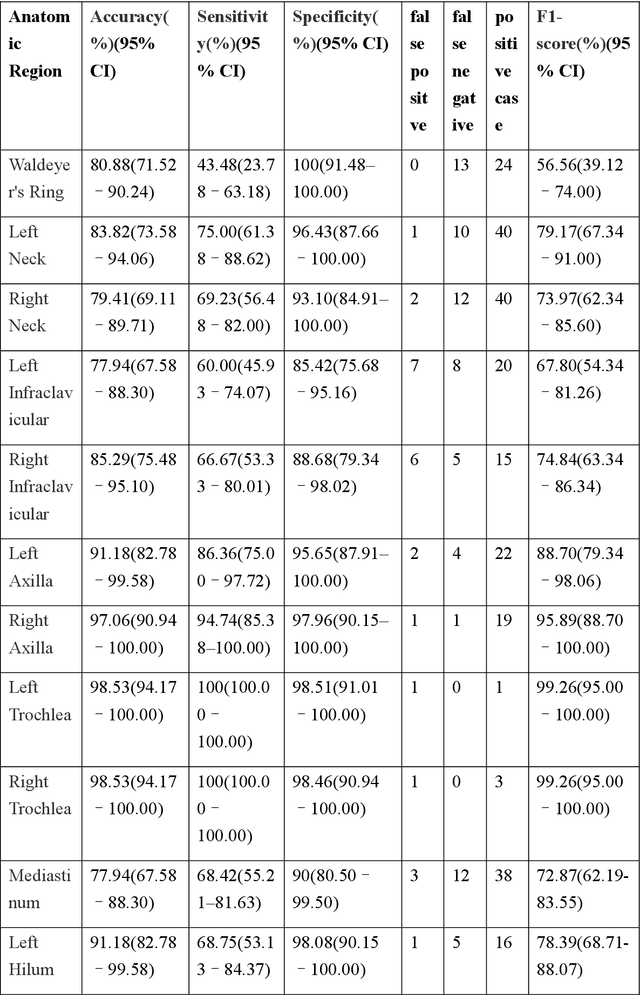
Abstract:Purpose: To develop a fully automated deep learning system, AutoLugano, for end-to-end lymphoma classification by performing lesion segmentation, anatomical localization, and automated Lugano staging from baseline FDG-PET/CT scans. Methods: The AutoLugano system processes baseline FDG-PET/CT scans through three sequential modules:(1) Anatomy-Informed Lesion Segmentation, a 3D nnU-Net model, trained on multi-channel inputs, performs automated lesion detection (2) Atlas-based Anatomical Localization, which leverages the TotalSegmentator toolkit to map segmented lesions to 21 predefined lymph node regions using deterministic anatomical rules; and (3) Automated Lugano Staging, where the spatial distribution of involved regions is translated into Lugano stages and therapeutic groups (Limited vs. Advanced Stage).The system was trained on the public autoPET dataset (n=1,007) and externally validated on an independent cohort of 67 patients. Performance was assessed using accuracy, sensitivity, specificity, F1-scorefor regional involvement detection and staging agreement. Results: On the external validation set, the proposed model demonstrated robust performance, achieving an overall accuracy of 88.31%, sensitivity of 74.47%, Specificity of 94.21% and an F1-score of 80.80% for regional involvement detection,outperforming baseline models. Most notably, for the critical clinical task of therapeutic stratification (Limited vs. Advanced Stage), the system achieved a high accuracy of 85.07%, with a specificity of 90.48% and a sensitivity of 82.61%.Conclusion: AutoLugano represents the first fully automated, end-to-end pipeline that translates a single baseline FDG-PET/CT scan into a complete Lugano stage. This study demonstrates its strong potential to assist in initial staging, treatment stratification, and supporting clinical decision-making.
Closing the Safety Gap: Surgical Concept Erasure in Visual Autoregressive Models
Sep 26, 2025Abstract:The rapid progress of visual autoregressive (VAR) models has brought new opportunities for text-to-image generation, but also heightened safety concerns. Existing concept erasure techniques, primarily designed for diffusion models, fail to generalize to VARs due to their next-scale token prediction paradigm. In this paper, we first propose a novel VAR Erasure framework VARE that enables stable concept erasure in VAR models by leveraging auxiliary visual tokens to reduce fine-tuning intensity. Building upon this, we introduce S-VARE, a novel and effective concept erasure method designed for VAR, which incorporates a filtered cross entropy loss to precisely identify and minimally adjust unsafe visual tokens, along with a preservation loss to maintain semantic fidelity, addressing the issues such as language drift and reduced diversity introduce by na\"ive fine-tuning. Extensive experiments demonstrate that our approach achieves surgical concept erasure while preserving generation quality, thereby closing the safety gap in autoregressive text-to-image generation by earlier methods.
Multimodal Medical Endoscopic Image Analysis via Progressive Disentangle-aware Contrastive Learning
Aug 23, 2025

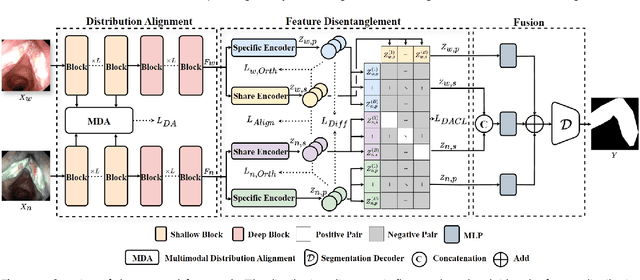

Abstract:Accurate segmentation of laryngo-pharyngeal tumors is crucial for precise diagnosis and effective treatment planning. However, traditional single-modality imaging methods often fall short of capturing the complex anatomical and pathological features of these tumors. In this study, we present an innovative multi-modality representation learning framework based on the `Align-Disentangle-Fusion' mechanism that seamlessly integrates 2D White Light Imaging (WLI) and Narrow Band Imaging (NBI) pairs to enhance segmentation performance. A cornerstone of our approach is multi-scale distribution alignment, which mitigates modality discrepancies by aligning features across multiple transformer layers. Furthermore, a progressive feature disentanglement strategy is developed with the designed preliminary disentanglement and disentangle-aware contrastive learning to effectively separate modality-specific and shared features, enabling robust multimodal contrastive learning and efficient semantic fusion. Comprehensive experiments on multiple datasets demonstrate that our method consistently outperforms state-of-the-art approaches, achieving superior accuracy across diverse real clinical scenarios.
TrackingMiM: Efficient Mamba-in-Mamba Serialization for Real-time UAV Object Tracking
Jul 02, 2025Abstract:The Vision Transformer (ViT) model has long struggled with the challenge of quadratic complexity, a limitation that becomes especially critical in unmanned aerial vehicle (UAV) tracking systems, where data must be processed in real time. In this study, we explore the recently proposed State-Space Model, Mamba, leveraging its computational efficiency and capability for long-sequence modeling to effectively process dense image sequences in tracking tasks. First, we highlight the issue of temporal inconsistency in existing Mamba-based methods, specifically the failure to account for temporal continuity in the Mamba scanning mechanism. Secondly, building upon this insight,we propose TrackingMiM, a Mamba-in-Mamba architecture, a minimal-computation burden model for handling image sequence of tracking problem. In our framework, the mamba scan is performed in a nested way while independently process temporal and spatial coherent patch tokens. While the template frame is encoded as query token and utilized for tracking in every scan. Extensive experiments conducted on five UAV tracking benchmarks confirm that the proposed TrackingMiM achieves state-of-the-art precision while offering noticeable higher speed in UAV tracking.
FedGraph: A Research Library and Benchmark for Federated Graph Learning
Oct 08, 2024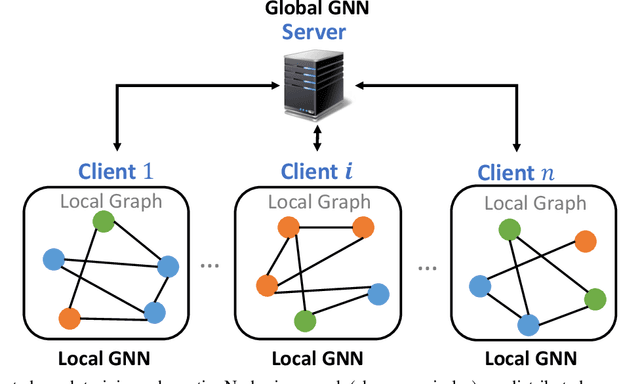
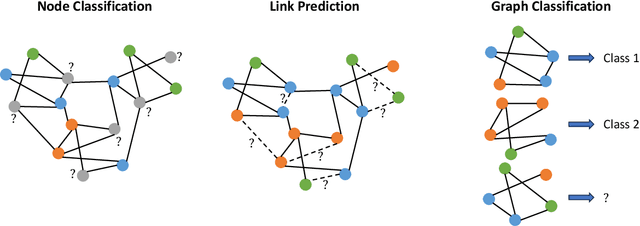
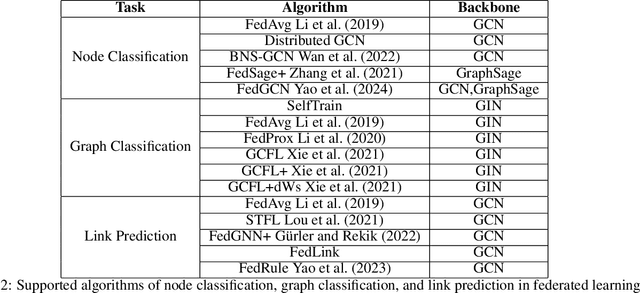
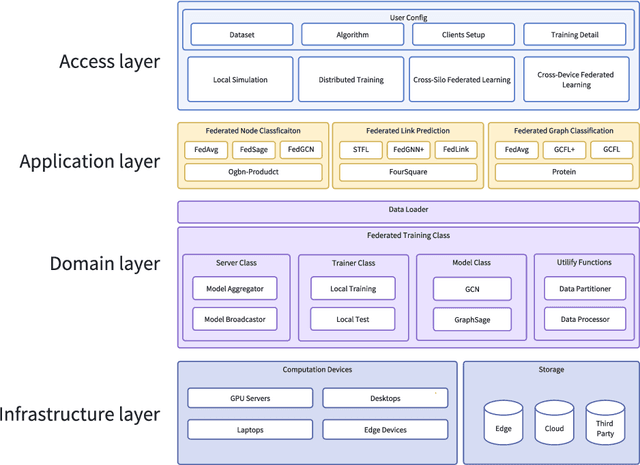
Abstract:Federated graph learning is an emerging field with significant practical challenges. While many algorithms have been proposed to enhance model accuracy, their system performance, crucial for real-world deployment, is often overlooked. To address this gap, we present FedGraph, a research library designed for practical distributed deployment and benchmarking in federated graph learning. FedGraph supports a range of state-of-the-art methods and includes profiling tools for system performance evaluation, focusing on communication and computation costs during training. FedGraph can then facilitate the development of practical applications and guide the design of future algorithms.
MTSCI: A Conditional Diffusion Model for Multivariate Time Series Consistent Imputation
Aug 11, 2024



Abstract:Missing values are prevalent in multivariate time series, compromising the integrity of analyses and degrading the performance of downstream tasks. Consequently, research has focused on multivariate time series imputation, aiming to accurately impute the missing values based on available observations. A key research question is how to ensure imputation consistency, i.e., intra-consistency between observed and imputed values, and inter-consistency between adjacent windows after imputation. However, previous methods rely solely on the inductive bias of the imputation targets to guide the learning process, ignoring imputation consistency and ultimately resulting in poor performance. Diffusion models, known for their powerful generative abilities, prefer to generate consistent results based on available observations. Therefore, we propose a conditional diffusion model for Multivariate Time Series Consistent Imputation (MTSCI). Specifically, MTSCI employs a contrastive complementary mask to generate dual views during the forward noising process. Then, the intra contrastive loss is calculated to ensure intra-consistency between the imputed and observed values. Meanwhile, MTSCI utilizes a mixup mechanism to incorporate conditional information from adjacent windows during the denoising process, facilitating the inter-consistency between imputed samples. Extensive experiments on multiple real-world datasets demonstrate that our method achieves the state-of-the-art performance on multivariate time series imputation task under different missing scenarios. Code is available at https://github.com/JeremyChou28/MTSCI.
Blaze: Simplified High Performance Cluster Computing
Feb 06, 2019
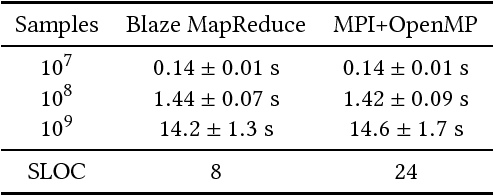
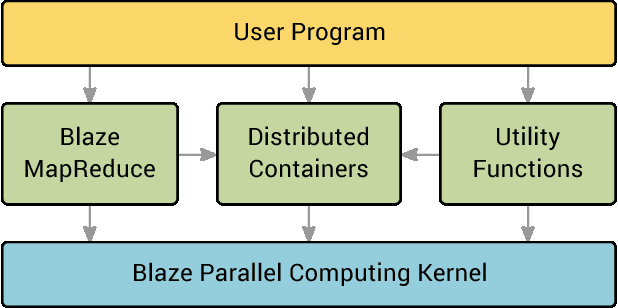

Abstract:MapReduce and its variants have significantly simplified and accelerated the process of developing parallel programs. However, most MapReduce implementations focus on data-intensive tasks while many real-world tasks are compute intensive and their data can fit distributedly into the memory. For these tasks, the speed of MapReduce programs can be much slower than those hand-optimized ones. We present Blaze, a C++ library that makes it easy to develop high performance parallel programs for such compute intensive tasks. At the core of Blaze is a highly-optimized in-memory MapReduce function, which has three main improvements over conventional MapReduce implementations: eager reduction, fast serialization, and special treatment for a small fixed key range. We also offer additional conveniences that make developing parallel programs similar to developing serial programs. These improvements make Blaze an easy-to-use cluster computing library that approaches the speed of hand-optimized parallel code. We apply Blaze to some common data mining tasks, including word frequency count, PageRank, k-means, expectation maximization (Gaussian mixture model), and k-nearest neighbors. Blaze outperforms Apache Spark by more than 10 times on average for these tasks, and the speed of Blaze scales almost linearly with the number of nodes. In addition, Blaze uses only the MapReduce function and 3 utility functions in its implementation while Spark uses almost 30 different parallel primitives in its official implementation.
 Add to Chrome
Add to Chrome Add to Firefox
Add to Firefox Add to Edge
Add to Edge